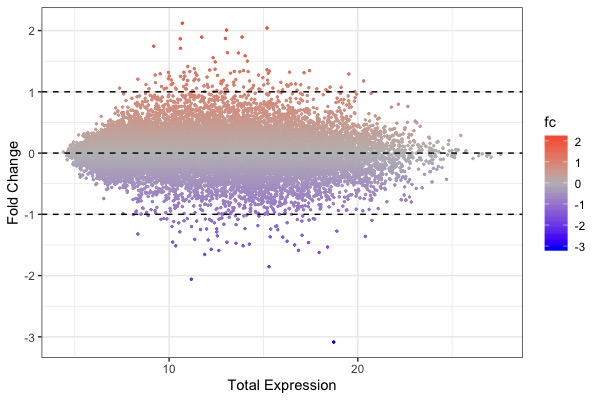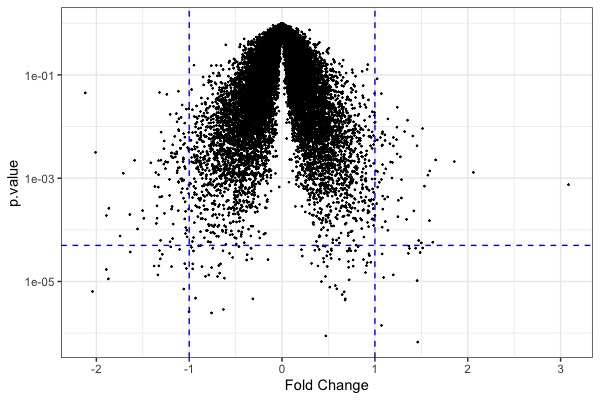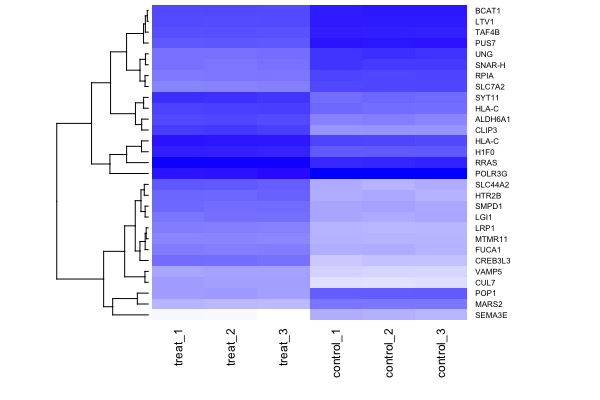BioMed-R-2022
| MA plot | Volcano plot | Heat map |
|---|---|---|
Course Overview
Welcome to Introductory BioMedical Genomics, a seminar course for advanced undergraduates and graduate students. A genome is the total genetic content of an organism. Driven by breakthroughs such as the decoding of the first human genome and rapid DNA and RNA-sequencing technologies, biomedical sciences are undergoing a rapid & irreversible transformation into a highly data-intensive field, that requires familiarity with concepts in both biology, computational, and data sciences.
Genome information is revolutionizing virtually all aspects of life sciences including basic research, medicine, and agriculture. Meanwhile, use of genomic data requires life scientists to be familiar with concepts and skills in biology, computer science, as well as statistics.
This workshop is designed to introduce computational analysis of genomic data through hands-on computational exercises. Students are expected to be able to replicate key results of data analysis from published studies.
The pre-requisites of the course are college-level courses in molecular biology, cell biology, and genetics. Introductory courses in computer programming and statistics are preferred but not strictly required.
Learning goals
By the end of this course successful students will be able to:
- Describe next-generation sequencing (NGS) technologies & contrast it with traditional Sanger sequencing
- Explain applications of NGS technology including pathogen genomics, cancer genomics, human genomic variation, transcriptomics, meta-genomics, epi-genomics, and microbiome.
- Visualize and explore genomics data using R & RStudio
- Replicate key results using a raw data set produced by a primary research paper
A sample of original NGS paper with data sets
- de la Cuesta-Zuluaga J, Spector TD, Youngblut ND, Ley RE. 2021. Genomic insights into adaptations of trimethylamine-utilizing methanogens to diverse habitats, including the human gut. mSystems 6:e00939-20.
- Reiter et al. 2021. Transcriptomics provides a genetic signature of vineyard site and offers insight into vintage-independent inoculated fermentation outcomes. mSystems 6:e00033-21
- Renninger et al (2021). Indoor dust as a matrix for surveillance of COVID-19. mSystems 6:e01350-20.. Data available at Dryad
- Litzenburger et al. Single-cell epigenomic variability reveals functional cancer heterogeneity. Genome Biol 18, 15 (2017).
- Cao et al. Single-cell chromatin and RNA analysis. Science (2018)
Web Links
- Install R base: https://cloud.r-project.org
- Install R Studio (Desktop version): http://www.rstudio.com/download
- R Markdown Template: R markdown template (by Hector)
- Textbook: Introduction to R for Biologists
- Download: R datasets
- A reference book: R for Data Science (Wickharm & Grolemund)
Quizzes and Exams
Student performance will be evaluated by attendance, weekly assignments, quizzes, and a final report in R Markdown:
- Attendance & In-class participation: 100 pts
- Assignments: 5 x 10 = 50 pts
- Quizzes: 2 x 25 pts = 50 pts
- Mid-term: 50 pts
- Final presentation & report: 50 pts
Total: 300 pts
Tips for Success
To maximize the your experience we strongly recommend the following strategies:
- Attendance is required. Video camera on is preferred.
- Follow the directions for efficiently, finding high-impact papers, reading science research papers and preparing presentations.
- Read the papers, watch required videos and do the exercises regularly, long before you attend class.
- Attend all classes, as required. Late arrival results in loss of points.
- Keep up with online exercises. Don’t wait until the due date to start tasks.
- Take notes or annotate slides while attending the lectures.
- Listen actively and participate in class and in online discussions.
- Review and summarize material within 24 hrs after class.
- Observe the deadlines for submitting your work. Late submissions incur penalties.
- Put away cell phones, do not TM, email or play computer games in class.
Hunter/CUNY Policies
- Policy on Academic Integrity
Hunter College regards acts of academic dishonesty (e.g., plagiarism, cheating on homework, online exercises or examinations, obtaining unfair advantage, and falsification of records and official documents) as serious offenses against the values of intellectual honesty. The College is committed to enforcing the CUNY Policy on Academic Integrity, and we will pursue cases of academic dishonesty according to the Hunter College Academic Integrity Procedures. Students will be asked to read this statement before exams.
- ADA Policy
In compliance with the American Disability Act of 1990 (ADA) and with Section 504 of the Rehabilitation Act of 1973, Hunter College is committed to ensuring educational parity and accommodations for all students with documented disabilities and/or medical conditions. It is recommended that all students with documented disabilities (Emotional, Medical, Physical, and/or Learning) consult the Office of AccessABILITY, located in Room E1214B, to secure necessary academic accommodations. For further information and assistance, please call: (212) 772- 4857 or (212) 650-3230.
- Syllabus Policy
Except for changes that substantially affect implementation of the evaluation (grading) statement, this syllabus is a guide for the course and is subject to change with advance notice, announced in class or posted on Blackboard.
Course Schedule
Jan 29, 2022
- Introduction to NGS (slides available on Blackboard)
- Literature search (by groups)
- Assignment 1 (Due 2/4/2022. Friday 8pm EST). Upload your slide on Blackboard
Feb 5, 2022
- Introduction to NGS: (slides available on Blackboard)
- 1-slide presentations on NGS
- R Tutorial, Part 1
- Assignment 2. Submit R code on Blackboard
Feb 12, 2022
- No class (holiday break)
Feb 19, 2022
- R Tutorial: Part 2.
- Assignment 3 (10 pts). R Markdown upload (by Wed 8pm)
Feb 26, 2022
- TBD
March 5, 2022
- TBD
March 12, 2022
- TBD
March 19, 2022
- Mid-term
March 26, 2022
- TBD
April 2, 2022
- TBD
April 9, 2022
- TBD
April 16, 2020
- No class (Spring break)
April 23, 2022
- TBD
April 30, 2022
- TBD
May 7, 2022
- TBD
May 14, 2022
- TBD
- Submit your Teacher's Evaluation, using either:
- Personal computer at www.hunter.cuny.edu/te; or,
- Smartphone at www.hunter.cuny.edu/mobilete
May 21, 2022
- 10 pm: Final report Due (Blackboard submission)


